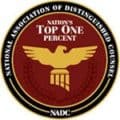Chicago Personal Injury Lawyer Discusses the McDonald’s Hot Coffee Lawsuit
Recently I was picking a jury in an auto accident case and as usual, one of the prospective jurors brought up the McDonald’s hot coffee case, and how she thought that the whole justice system is flawed because people are looking for easy money for stupid things such as spilling coffee on themselves. I politely asked her if she knew the real facts of the McDonald’s hot coffee case and she admitted that she did not. I let her know that I appreciated her honesty and informed her that many people have this common long-held belief about our civil justice system.
She remained on the jury and after the trial, she approached me and said she had finally researched the McDonald’s hot coffee case and was a bit ashamed that for so long she had this warped view of our civil justice system. She was only 20 years old and wondered why she even knew of this case, which happened in 1992 in New Mexico. I explained to her that the corporate world (which includes insurance companies) continues their attempts to gain immunity for their negligent acts by calling attention to cases that get under people’s skin and then uses those cases as a means of changing the justice system as a whole.
Whether the McDonald’s hot coffee case is one of those cases that gets under your skin and make you think that citizens have taken advantage of America’s legal system will depend on your own viewpoint after reading the facts. I’ll give you some of the facts in this article but read them for yourself like clearly others have done. In fact a Google search for “hot coffee lawsuit” turns up over 16 million hits.
McDonald’s Hot Coffee Case Facts
- After receiving the order of coffee from the drive-thru, the plaintiff’s grandson pulled his car forward and stopped.
- The plaintiff placed the cup between her knees and attempted to remove the plastic lid from the cup. In the process, the entire contents of the cup spilled into her lap.
- A vascular surgeon determined that the plaintiff suffered full thickness burns (or third-degree burns) over 6 percent of her body, specifically her inner thighs, buttocks, genital and groin areas.
- She was hospitalized for eight days, during which time she underwent skin grafting and surgical removal of tissue.
- The plaintiff sought to settle her claim for $20,000, but McDonald’s refused.
- During litigation, McDonald’s produced documents showing more than 700 claims by people burned by its coffee – some claims involved third-degree burns. This history documented McDonald’s knowledge about the extent and nature of this hazard.
- McDonald’s said that, based on a consultant’s advice, it held its coffee at between 180 and 190 degrees Fahrenheit to maintain optimum taste. (Coffee served at home is generally 135 to 140 degrees).
- McDonald’s quality assurance manager testified that a burn hazard exists with any food substance served at 140 degrees or above and that McDonald’s coffee was not fit for consumption because it would burn the mouth and throat.
- The quality assurance manager further testified that the company actively enforces a requirement that coffee be held in the pot at 185 degrees, plus or minus five degrees. He also testified that while burns would occur, McDonald’s had no intention of reducing the “holding temperature” of its coffee.
- Plaintiff’s expert, a scholar in thermodynamics as applied to human skin burns, testified that liquids at 180 degrees will cause a full thickness burn to human skin in as little as two seconds.
- Other testimony showed that as the temperature decreases toward 155 degrees, the extent of the burn relative to that temperature decreases exponentially. Thus, if plaintiff’s spill had involved coffee at 155 degrees, the liquid would have cooled and given her time to avoid a serious burn.
- McDonald’s asserted that customers buy coffee on their way to work or home, intending to consume it there. However, the company’s own research showed that customers intend to consume the coffee immediately while driving.
- McDonald’s also argued that consumers know coffee is hot and that its customers want it that way. The company admitted its customers were unaware that they could suffer third-degree burns from the coffee and that a statement on the side of the cup was not a “warning” but a “reminder” since the location of the writing would not warn customers of the hazard.
- The jury awarded plaintiff $200,000 in compensatory damages. This amount was reduced to $160,000 because the jury found plaintiff 20 percent at fault in the spill. The jury also awarded plaintiff $2.7 million in punitive damages, which equals about two days of McDonald’s coffee sales.
- The trial court subsequently reduced the punitive award to $480,000 – or three times compensatory damages – even though the judge called McDonald’s conduct reckless, callous and willful.
- The parties eventually entered into a secret settlement which has never been revealed to the public, despite the fact that this was a public case, litigated in public and subjected to extensive media reporting. It has been reported that the settlement amount was for a sum much less than the judge’s reduced award.
So Who Really Profits from Hot Coffee?
The McDonalds lawsuit was ridiculous, right? We’re all bearing the burden of higher insurance rates because there is an outbreak of lawsuits, right? Malpractice lawsuits are driving doctors out of state, right?
That’s what the corporate world would have you believe but it couldn’t be further from the truth.
The corporate world is now, and is always, pushing for “tort reform,” claiming that lawsuits are a burden on the economy. However, since 1975 the number of lawsuits has actually declined. Although corporate America is complaining about how lawsuits are “hurting the economy” the vast majority of lawsuits are brought by corporations, not individuals.
So, why is there a widespread opinion of a “lawsuit crisis”? Why do we hear about the need for “tort reform” (legislation that would limit citizens rights to a jury trial or limit the amount of accountability corporations have)?
It wasn’t until the 1950’s that lawyers began to make progress in establishing corporate responsibility for injuries to workers and consumers. Corporations started to be held accountable and as a result, their insurance companies were increasingly being forced to pay damages. The insurance industry responded with a public relations campaign against “excessive awards.” Their strategy was to convince people who might sit on juries that there was a problem.
By the 1980s, the insurance industry wasn’t making as much money as they used to. Therefore, they decided it was time to move beyond targeting prospective jurors, and to take on the law itself. Their goal was to limit individual’s right to a jury trial. Their ad copy pointed out that “everybody pays” for lawsuits brought by individuals. The industry couldn’t very well attack consumer and environmental protection or victims. Instead they targeted the trial lawyers. Several tort reform measures were introduced in state legislatures.
Lobbyists were mobilized to push the tort reform bills through state legislatures. They also targeted journalists and dispersed phony statistics about the “costs of frivolous lawsuits”. Large corporations created fake grassroots groups like Citizens Against Lawsuit Abuse and set up chapters in local Chambers of Commerce. Fake stories of bizarre lawsuits buzzed on the internet, and major media outlets.
Have insurance rate gone up? Yep. The insurance industry is an extremely profitable one. The insurance companies typically make most of their profits in stocks and bonds so when the stock market is not performing well, either are the insurance companies. Therefore, they increase their premiums to maintain their huge profit margins. Then, their marketing machine, still hard at work, blames the trial lawyers and the lawsuit crisis for the increase in rates.
So what will tort reform accomplish? It will limit our ability to hold corporations accountable for their misdeeds. Corporate America has succeeded to a large extent in buying up our legislators and capturing regulatory bodies. We must not let them take over control of the judicial system as well.
Hopefully after reading this, you’ll have a little more information about the infamous McDonald’s hot coffee lawsuit. It has been routinely cited as an example of how citizens have taken advantage of America’s legal system, but is that a fair rendition of the facts? I hope you’ll question why you know about this lawsuit, why it always becomes part of the discussion over the civil justice system. I hope you will now see how and why the case generated so much media attention, who paid for the effort and to what end. Lastly, I hope you now have the information to help you decide who really profits from hot coffee.
Matthew L. Willens
Willens & Baez
Personal Injury Lawyer Chicago











